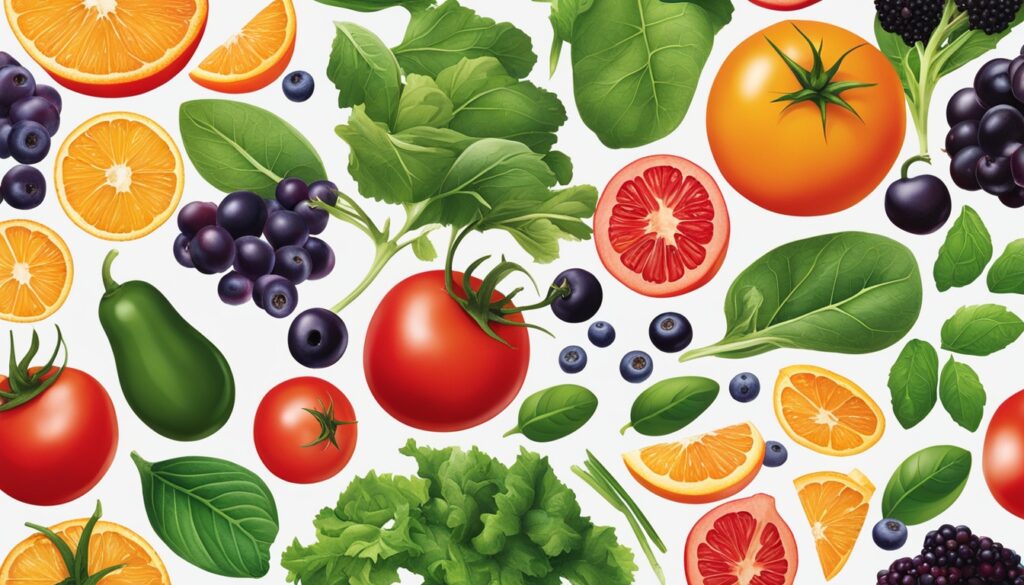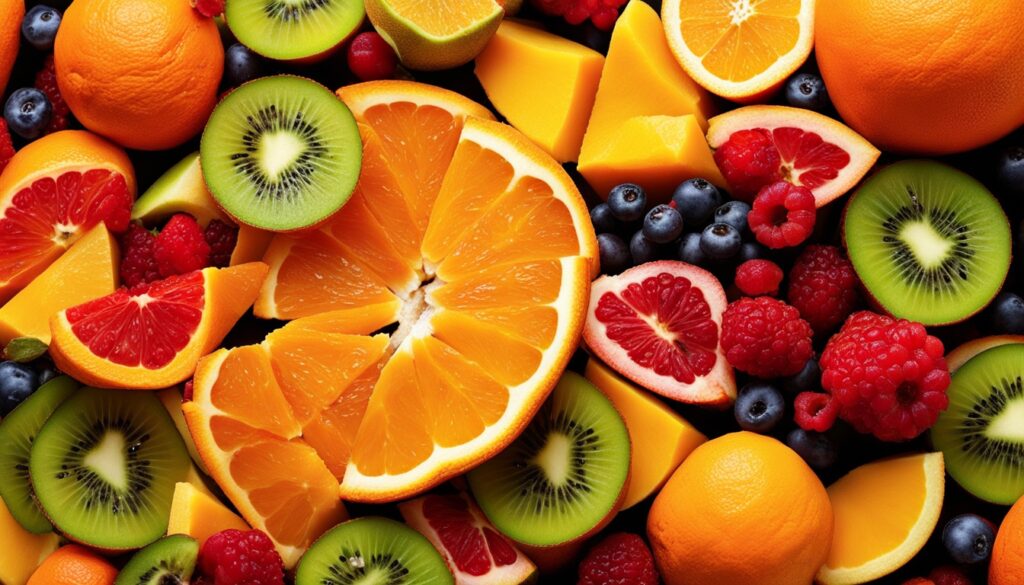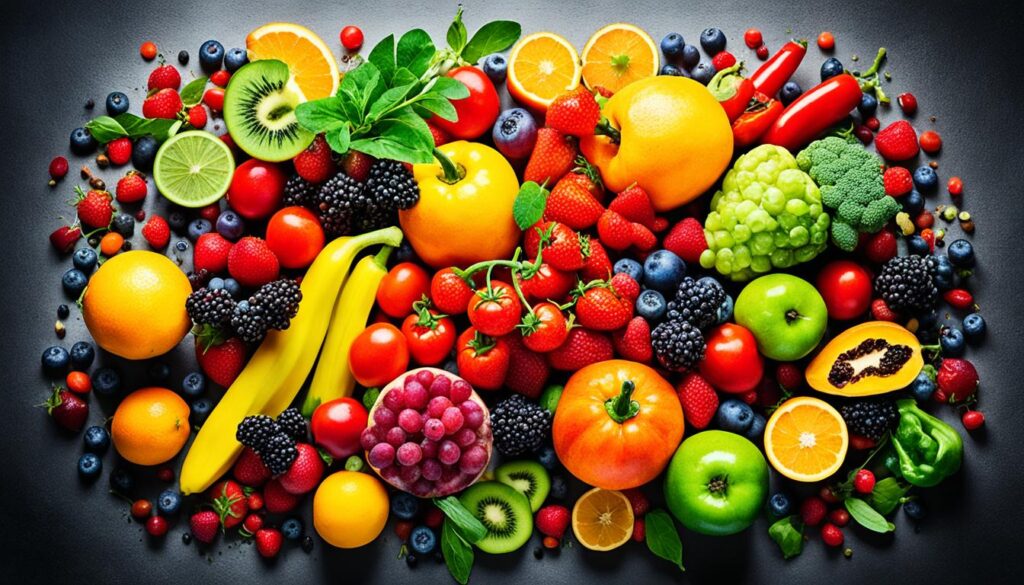Antioxidants are key in keeping us healthy. They fight off free radicals that can cause diabetes and cancer. You can find them in plant foods, like fruits, veggies, and grains. It’s vital to eat these foods to boost our antioxidant intake.
Vitamin C and vitamin E are well-known antioxidants. You get vitamin C from citrus, berries, and greens. Nuts, seeds, and oils are good for vitamin E. These vitamins work together to protect our cells from harm.
In the food industry, antioxidant preservatives keep our food fresh longer. They help food items last and maintain their quality. Preservatives are in many items, from snacks to dressings.
So, we should eat plant foods and use products rich in antioxidants. This is crucial for a healthy life.
Key Takeaways:
- Antioxidants help the body fight harmful free radicals and can prevent health conditions like diabetes and cancer.
- Plant-based foods are rich in antioxidants, with vitamin C and vitamin E being two notable examples.
- Antioxidant preservatives are used in the food industry to extend the shelf life of products.
- Incorporating antioxidants into our diet is crucial for maintaining overall health and well-being.
- Remember to enjoy a variety of fruits, vegetables, nuts, and whole grains to obtain a diverse range of antioxidants.
Understanding Antioxidants and Free Radicals
Antioxidants are key in guarding our cells from the harm of free radicals. But, what are free radicals? And why are antioxidants vital?
Free radicals are unstable. They form constantly in our bodies during regular cell processes. They’re useful in fighting infections and helping cell signaling.
An overload of free radicals, though, creates oxidative stress. This is when our body can’t keep up with the free radicals it’s making. Their damage affects DNA, proteins, lipids, and can lead to health issues like cancer, heart disease, and brain disorders.
Antioxidants stop free radicals from harming us. They do this by interacting with the radicals, making them stable. This stops them from damaging healthy cells, which cuts the danger of health issues caused by oxidative stress.
Some antioxidants our bodies make naturally. But, we need more from our diet and other sources. Having lots of antioxidants in our diet helps keep things balanced and our health in check.

Now, we’ve seen how important antioxidants are. Next, let’s look at the foods that are rich in these protective molecules.
Antioxidants in Foods
Antioxidants are key to staying healthy and help all living things thrive. They’re mainly in plants and animal foods. Which means it’s simple to get them into every meal.
When you see bright fruits and veggies, you’re looking at antioxidant powerhouses. Berries stand out, with blueberries, strawberries, and raspberries leading the pack. Green tea, coffee, and dark chocolate are solid choices too.
Eating a variety of these foods gives us a range of antioxidants. They all work together to keep our cells safe, lower inflammation, and keep our body in top shape.
The Health Benefits of Antioxidants
Getting plenty of antioxidants in your diet has a lot of perks. Here are some important ones:
- Reduced risk of chronic diseases: Antioxidants fight off free radicals, stopping cell damage. This helps cut the risk of major diseases like heart issues, cancer, and memory loss.
- Enhanced immune function: Antioxidants, especially vitamin C, help our immune cells stay strong and work well.
- Improved skin health: Berries and green tea’s antioxidants can make your skin better. They lower stress, help your skin make collagen, and shield it from sunlight.
- Anti-inflammatory properties: Many antioxidants fight inflammation. This can lower the risk of illnesses such as heart problems and diabetes.
- Brain health: Dark chocolate’s flavonoids are great for the mind. They might improve how well you think and lower age-related brain problems.
Diets full of antioxidants bring many health benefits. They’re good for our whole being.

Hippocrates knew the score: what we eat really affects our health. A diet rich in antioxidants is a strong choice for supporting our body’s defenses and staying healthy.
| Antioxidant-Rich Foods | Main Antioxidants |
|---|---|
| Fruits (e.g., berries, citrus fruits) | Vitamin C, flavonoids |
| Vegetables (e.g., spinach, kale) | Vitamin C, beta-carotene, various phytochemicals |
| Green tea | Catechins |
| Coffee | Chlorogenic acid |
| Dark chocolate | Flavonoids |
Types of Dietary Antioxidants
Antioxidants are key for staying healthy. They come in two types: water-soluble and fat-soluble. Each type works in unique ways to help your body.
Water-Soluble Antioxidants
If something is water-soluble, it dissolves in water. These antioxidants work inside and outside your cells. They save cells from getting harmed by free radicals. Vitamin C is a famous water-soluble antioxidant. You can get it from things like oranges, strawberries, and peppers.

Fat-Soluble Antioxidants
Fat-soluble antioxidants protect cell membranes from damage. They need fats to be absorbed well. Vitamin E is a main fat-soluble antioxidant. It’s in nuts, seeds, and oils. Vitamin E teams up with other antioxidants to fight off free radicals.
Flavonoids
Flavonoids are another type of antioxidant found in plants. They make fruits and veggies colorful. Foods high in flavonoids, like blueberries and green tea, are great for your health.
| Water-Soluble Antioxidants | Fat-Soluble Antioxidants | Flavonoids |
|---|---|---|
| Vitamin C | Vitamin E | Blueberries |
| Citrus Fruits | Nuts | Cocoa |
| Bell Peppers | Seeds | Green Tea |
It’s important to eat foods rich in all three types of antioxidants. This mix helps keep your body fully protected.
The Use of Antioxidant Supplements
Getting enough antioxidants in your diet is key for staying healthy. But, taking too many supplements can cause problems. They help our cells stay healthy and protect us from damage. However, taking too much can be harmful.
Eating whole foods, like fruits and veggies, is the best way to get antioxidants. These natural sources help our body in many ways. They keep us healthy by working together.
Most people get all the antioxidants they need from food. Only some should take supplements, like those lacking certain nutrients. Also, people who find it hard to eat healthy due to various reasons might need them.
“Supplements should be used carefully, especially high doses, with help from a doctor,” says nutrition expert Dr. Emma Johnson.
For people who can’t eat enough fruits and veggies, small doses of supplements might help. This can fill the nutritional space. It supports your health and well-being.
The Risks of High-Dose Antioxidant Supplements
Too much of certain supplements can be bad for your health. They might even cause harm instead of helping.
A recent study in the Journal of the American Medical Association looked into high-dose antioxidants. It showed that some supplements, like vitamin E and beta-carotene, could lead to serious health problems.
Also, some supplements may not mix well with certain medications. They could make existing health issues worse. Always talk to your doctor before adding any new supplements to your routine.
Incorporating Antioxidants Safely
Here are some easy ways to add more antioxidants to your diet safely:
- Eat lots of colorful fruits and vegetables every day.
- Add berries, greens, nuts, seeds, and whole grains to your meals.
- Cook in ways that keep the most nutrients, like steaming or light sautéing.
- Meet with a dietitian or nutritionist to figure out your nutrient requirements.
- If you choose to take supplements, only take a small amount and get advice from a professional.
The Importance of Antioxidants
Antioxidants are vital in many areas like drug-making, beauty, and health care. Studies show their huge benefits in fighting diseases and keeping us healthy.
In medicine, they are a big deal. They fight off free radicals and lower the chance of diseases like cancer and heart issues. Antioxidants protect our cells, keeping us healthy.
Antioxidants are also key in beauty products. They help us look younger by fighting wrinkles. Vitamins like C and E shield our skin from harm, making it look fresh and young.
And in healthcare, antioxidants are essential too. They can prevent serious diseases and reduce inflammation. These actions help with conditions like arthritis and asthma. They also make our immune system stronger.
The Power of Antioxidants in Disease Prevention
Antioxidants are superstars in fighting off diseases. A diet high in them can prevent cancers, heart disease, and more. They do this by protecting our cells from damage.
They stop free radicals from harming us. By doing so, they lower the risk of stress and DNA damage. These issues can lead to many health problems.
Some antioxidants in fruits and veggies help lower cancer risks. For example, lycopene in tomatoes can reduce prostate cancer risks. Berries’ antioxidants fight against cancers like breast and colon cancer.
But antioxidants do more than prevent diseases. They also help us stay healthy and age well. They are good for the brain, heart, and the immune system.
Embracing the Power of Antioxidants
Knowing all this, we should try to get more antioxidants in our diet. It’s best to eat lots of fruits, veggies, nuts, seeds, and grains.
You can also find antioxidants in supplements. But remember, real foods are usually better than pills. Be careful and choose natural sources when you can.
By eating lots of antioxidants, we can improve our health and maybe prevent diseases. Antioxidants are amazing for our bodies.

Antioxidants and Food Preservation
Antioxidants are key in keeping food fresh longer. They stop the oxidation process, which causes food to go bad. This is important for both natural and processed foods.
One good way to use antioxidants for food preservation is by using them in edible films. These films cover the food, protecting it from air and moisture. This keeps the food fresh for a longer time.
Vitamin C is a well-known antioxidant and a great preservative. It keeps the color, flavor, and texture of foods. It’s also good at fighting against free radicals that harm food.
Certain fruits, like citrus fruits, also have antioxidants. These can be added to food to keep it from spoiling. They make food last longer and are good for your health.
By using antioxidants, food makers can make their products last longer without losing quality. They can do this by using films, coatings, or adding antioxidants to the food. Antioxidants are a great way to solve food preservation problems.
Antioxidants in Food Preservation – An Overview
| Antioxidants | Benefit |
|---|---|
| Enhanced shelf life | Antioxidants inhibit oxidation, preventing spoilage and extending the freshness of food. |
| Improved product quality | Antioxidants help maintain the color, flavor, and texture of food, ensuring a better sensory experience for consumers. |
| Protection against oxidative damage | Antioxidants combat free radicals and oxidative stress, reducing the risk of deterioration and loss of nutrients in food. |
| Health benefits | Some antioxidants found naturally in food offer additional health benefits to consumers, promoting overall well-being. |
Antioxidants make food preservation better. They help products last longer and stay high quality. This is done by using edible films, coatings, or adding them directly to food. It’s a good way to make food products last longer in a natural and effective way.
Natural Antioxidants and Their Sources
Natural antioxidants are key in keeping our food fresh and flavorful. They come from plants and show up in many fruits, veggies, and tiny living things. Adding these foods to your meals brings a lot of health pluses. Now, we’re going to dive into some top plant sources of these antioxidants:
Fruits:
Fruits are standout when it comes to natural antioxidants. Think of oranges, blueberries, and strawberries for starters. These foods are packed with antioxidants like vitamin C, flavonoids, and anthocyanins. They combat free radicals, keeping us healthier.
Vegetables:
Veggies are a big deal for natural antioxidants too. Things like spinach, kale, and bright bell peppers lead the way here. They’re loaded with vitamin C, beta-carotene, and lutein. And don’t forget colorful picks like broccoli and sweet potatoes. Variety is key for getting a lot of different antioxidants.
Microorganisms:
Surprisingly, tiny living things can also be a source of antioxidants. Bacteria and fungi are among them. They make compounds that are good for our health. For example, Lactobacillus spp., Aspergillus spp., and Saccharomyces cerevisiae are well-known for their antioxidants.
So, adding these natural antioxidants to what you eat every day is a smart move. It helps fight off oxidative stress and boosts your health in general. Let’s keep going to find out more about why antioxidants are important.
The Human Antioxidant Defense System
The human body has a strong defense system against harm caused by oxidative damage. This system, called the human antioxidant defense system, fights off dangerous free radicals. It does this with the help of different enzymes and non-enzymatic substances.
Enzymatic Scavengers
Enzymatic scavengers are key players in our defense against oxidative stress. For example, superoxide dismutase changes superoxide radicals into less harmful substances. These include hydrogen peroxide and oxygen. This stops the creation of more damaging free radicals.
Glutathione peroxidase is another important enzyme. It removes hydrogen peroxide and lipid hydroperoxides. In doing so, it keeps our cells safe from damage.
Hydrophilic and Lipophilic Scavengers
Our defense system also features hydrophilic and lipophilic scavengers. Vitamin C, a hydrophilic antioxidant, guards against oxidative harm in water-rich places. It does this by giving up electrons to stop free radicals.
On the other hand, Vitamin E is a lipophilic antioxidant. This antioxidant is found in cell membranes. It protects against lipid peroxidation and keeps cell membranes strong.
All these scavengers, whether enzymes or antioxidants, work together. They keep our body safe from oxidative damage. This is vital for our health.
Understanding the Role
The human antioxidant defense system is critical for our health. It fights off free radicals and stops oxidative damage. This system is our body’s natural shield against disease, including cancer and heart diseases.
Learning more about this defense system shows us the value of eating foods rich in antioxidants. We should add plenty of fruits, vegetables, and other plant foods to our meals. This ensures our body gets the antioxidants it needs. These antioxidants help our defense system work well.
Conclusion
Getting enough antioxidants is key for good health and should be a top diet goal. The best sources are foods like fruits, veggies, and other plant foods. These items have many types of antioxidants. They help shield the body from stress and fight diseases.
Although it seems easy, taking antioxidant pills has its risks, especially in high amounts. It’s better to focus on eating whole foods. They not only give you antioxidants but also vital nutrients for your health.
Antioxidants are crucial for staying healthy. They fight off dangerous free radicals, lower damage from oxidation, and aid the immune system. Including a variety of antioxidant-rich foods in your meals brings you these great health benefits. This way, you move towards a healthier life.
FAQ
What is the role of antioxidants?
Antioxidants help your body fight off free radicals. These are linked to diseases like diabetes and cancer. They’re also key in keeping foods fresh for longer.
What are free radicals and how do antioxidants neutralize them?
Free radicals are unstable and can harm cells. Antioxidants stabilize them by giving electrons. This stops them from damaging our cells.
Where can antioxidants be found?
You can find antioxidants in many plant foods, like fruits, veggies, and green tea. They’re also in some animal products. Key antioxidants include vitamins C and E, plus flavonoids.
Are there different types of antioxidants?
Absolutely, there are different types. Some work in water, others in fats. For example, vitamins C and E are water-soluble. Fat-soluble ones help the cell walls stay healthy.
Are high-dose antioxidant supplements recommended?
Taking too many antioxidant supplements might do harm. It’s best to get them from food. But some people, like those with nutrient shortages, can benefit from low-dose supplements.
What are some potential benefits of antioxidants?
Antioxidants fight aging and inflammation. They’re studied in medicine and cosmetics for their health benefits. They could help prevent illnesses and keep you healthy.
How are antioxidants used in food preservation?
Antioxidants keep food from spoiling by slowing down oxidation. They’re added to some foods and used in coatings. Vitamin C, for instance, helps maintain processed foods.
What are some natural sources of antioxidants?
Antioxidants in nature prevent food from going bad. They come mostly from plants. Foods like oranges, blueberries, and broccoli are rich in them.
How does the human body defend against free radicals?
We have natural guards against free radicals. Enzymes and vitamins C and E team up to keep our cells safe. They stop oxidative damage.
Why is it important to consume antioxidants through natural sources?
Eating fruits and veggies is the best way to get antioxidants safely. Taking too many from pills can be risky. Whole foods contribute to our health and disease protection.




















